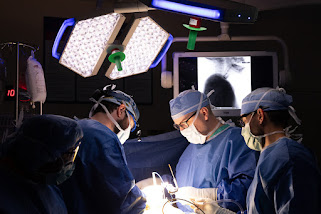 | |
| From left, Melisa Pierce, EdD, MPA, Jordan Wood, Ashley Givens, and Domenico Spadafora, PhD., led the EDGE for Success session. |
The program is designed to elevate professional growth for staff through a unique approach that blends leadership development, self-discovery, and mentorship in a supportive, engaging environment. Throughout the series, both mentors and mentees are building relationships that support quality improvement, professional development, and personal growth. The experience is about more than skill building; it’s about recognizing the potential in each other and helping it flourish.
Session 1 focused on the Foundations of Leadership, inviting participants to explore their values, reflect on their “why,” and think intentionally about the kind of impact they want to make in their roles. Through small group activities and lively discussions, participants unpacked how self-awareness, communication, and personal values contribute to effective leadership at every level.
Jordan Wood, medical oncology research assistant; Ashley Givens, medical education coordinator; and Domenico Spadafora, Ph.D., flow cytometry lab manager; led the session’s content delivery, presenting leadership concepts like values-based leadership, emotional intelligence, and defining their “why” with clarity and real-world insight that made the material resonate. Their contributions sparked meaningful conversations and set the tone for what’s shaping up to be a powerful and collaborative series.
The session was facilitated by Melisa Pierce, Ed.D., MPA, who developed and helps lead the EDGE program with a focus on recognizing potential, building meaningful connections, and supporting individual and institutional growth through leadership development.
“One of the best parts of launching EDGE has been meeting colleagues from across the Whiddon College of Medicine and seeing just how much talent, insight, and heart we have within our walls,” said Pierce, who serves as director of quality improvement in the Office of Accreditation and Planning. “This is about creating space for people to grow, be seen, and lead in their own way — and we’re just getting started.”
Stay tuned for more updates as the Whiddon College of Medicine continues to showcase EDGE participants’ voices, talents, and leadership journeys throughout the series.





